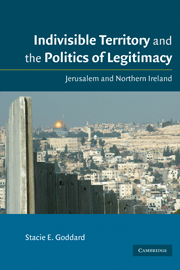Book contents
- Frontmatter
- Contents
- Acknowledgments
- 1 Introduction
- 2 Constructing Indivisibility: A Legitimation Theory of Indivisible Territory
- PART ONE CONSTRUCTING AN INDIVISIBLE IRELAND
- PART TWO JERUSALEM: THE ETERNAL INDIVISIBLE CITY
- Introduction
- 5 Dividing the Holy City
- 6 Jerusalem, Indivisible
- 7 How Northern Ireland Became Divisible (and Why Jerusalem Has Not)
- 8 Conclusion
- Bibliography
- Index
Introduction
from PART TWO - JERUSALEM: THE ETERNAL INDIVISIBLE CITY
Published online by Cambridge University Press: 26 January 2010
- Frontmatter
- Contents
- Acknowledgments
- 1 Introduction
- 2 Constructing Indivisibility: A Legitimation Theory of Indivisible Territory
- PART ONE CONSTRUCTING AN INDIVISIBLE IRELAND
- PART TWO JERUSALEM: THE ETERNAL INDIVISIBLE CITY
- Introduction
- 5 Dividing the Holy City
- 6 Jerusalem, Indivisible
- 7 How Northern Ireland Became Divisible (and Why Jerusalem Has Not)
- 8 Conclusion
- Bibliography
- Index
Summary
For thousands of years men have fought for the right to rule Jerusalem. From the eleventh to the sixteenth century, Europe and the Islamic world wrestled over the Holy City. In 1070, the Seljukian Turks seized Jerusalem from the Byzantine Empire. In response, in 1095 Pope Urban II called for a crusade to rescue Jerusalem from Muslim control, and by 1099, Frankish crusaders lay siege to the city, massacring those within its walls. By 1517, the Ottoman Turks had seized what became relatively permanent control over the city. However, in 1853, conflict over the status of the holy places sparked the Crimean War, as Russia used a dispute between Catholics and Orthodox Christians in Jerusalem as a reason to occupy portions of the Ottoman Empire. Backed by France and Britain, the Ottomans would maintain their control over Jerusalem, until their empire fell in World War I.
In more recent history, Jerusalem has resided at the core of the Arab-Israeli conflict. In 1948, Israel fought the war that would cement its independence; in the process, Jerusalem was divided, with Israel controlling the western half of the city, and Jordan declaring sovereignty over the east. The city remained divided until 1967, when Israel captured and annexed East Jerusalem in the Six Day War. Having soundly defeated Egypt, Syria, and Jordan, Israel had captured 26,000 square miles of territory, including Egypt's Sinai Peninsula and Syria's Golan Heights. Most profoundly, Israel had driven Jordan's troops from East Jerusalem.
- Type
- Chapter
- Information
- Indivisible Territory and the Politics of LegitimacyJerusalem and Northern Ireland, pp. 115 - 123Publisher: Cambridge University PressPrint publication year: 2009

